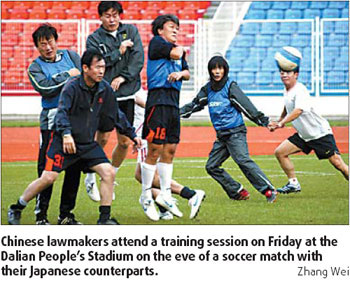Ping-pong diplomacy broke the ice in the Sino-US relationship during the early 1970s - and now another sport, soccer, could help further warm the thawing ties between China and Japan.
Lawmakers from the two countries are set to play a friendly soccer game on Saturday in the coastal city of Dalian, Liaoning Province.
The "soccer diplomacy" is aimed at deepening friendship and it will be the first time that deputies to China's National People's Congress (NPC) will engage in a sports exchange with another country, the legislative body said.
The NPC team, formed a month ago, consists of 35 members with an average age of 45. Most are NPC deputies from all walks of life, including government officials, scientists, entrepreneurs, teachers and doctors.
Participating from Japan are 23 lawmakers from the ruling Liberal Democratic Party, its coalition partner the New Komeito Party, the main opposition Democratic Party of Japan, the Japanese Communist Party and the People's New Party.
Japanese organizers said they are also pushing an initiative to hold a soccer match among Japanese, Chinese and South Korean lawmakers.
NPC deputies said the game will be more about friendship than competition.
"We're honored to be part of the game and be able to contribute to the development of Sino-Japanese relations," said team member and coach Fan Yunjie, former member of the women's national football team and now an NPC deputy.
Fan is the only one to have played professionally, but said her teammates had made big strides after three training sessions since May.
To prepare for the game, the Chinese team had a 2-hour warm-up session on Friday at the Dalian People's Stadium - the match venue.
Dressed in Nike sports suits and soccer shoes, the team had physical training, practiced corner and free kicks, and had a 20-minute mock match.
Although in their 40s or 50s, many appeared swift and strong.
"I've been running at least 2 km a day since May to improve my body strength," said Wang Ning, a professor at Ocean University of China.
Wang, in his 40s, said he is a soccer lover and played in a local team when he was young.
In consideration of the physical demands of the game, organizers have decided that the match be divided into three 20-minute sessions.
Experts said the game is a good way to improve Sino-Japanese relations.
"The game is particularly important with Japan having just elected a new prime minister," Liu Jiangyong, a senior researcher on Japan at Tsinghua University's Institute of International Studies, said.
He said China-Japan ties had, indeed, entered a new phase after former Japanese prime minister Shinzo Abe's "ice-breaking" visit to China last October and Premier Wen Jiabao's "ice-thawing" visit to Japan this April.
But the recent change in Japan's leadership has generated some uncertainty over the development of bilateral ties. "However, this match, to some extent, shows that the relationship continues to move along the right track," Liu said.
(China Daily October 13, 2007)


